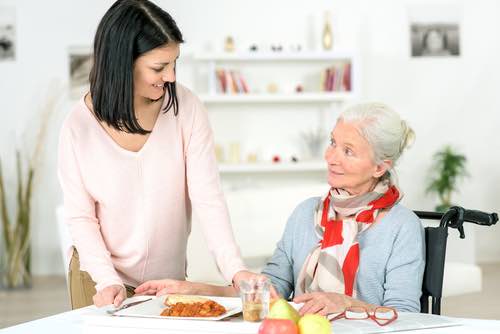
Whatever the cause, insufficient nutrition can cause health problems in seniors including fatigue, muscle weakness, depression, anemia, and a weakened immune system. That’s why it is vital to understand how nutritional needs change as people age and what you can do to encourage healthy eating habits in your loved one.
Planning a Healthy Diet for Seniors
As people get older, their bodies need different kinds and amounts of nutrients to support overall health. Your loved one’s metabolism will slow, meaning he or she won’t need as many calories as they used to. Their diet should also include plenty of calcium and Vitamin D for healthy bones, fiber to promote heart health and digestive health, potassium to reduce the risk of high blood pressure, healthy fats to reduce the risk of heart disease, and B12 to prevent anemia and support the nervous system.
But how do you ensure that your loved one is getting all of these nutrients?
-

-
Know how to put together a healthy meal – Make it a habit to read nutrition labels and understand portion sizes, and talk to your doctor about how many calories your loved one should be eating each day. You can also use visual tools like MyPlate to help your family member eat the right proportions of protein, vegetables, fruits, grains, and dairy.
-
Make it easy to make healthy choices – Stock the refrigerator and pantry with plenty of healthy food options. If your family member has difficulty opening packages or chopping fruits and veggies, take some time after each grocery shopping trip to prepare food ahead of time.
-
Make sure food tastes good – As people age, their tastes change and foods they once loved may begin tasting bland and unexciting. Consider trying different herbs and spices, and talk about which foods taste good and which ones don’t so you can prepare meals your loved one enjoys.
-
Make eating a social event – In our culture, eating usually isn’t a solitary activity. We gather around the table and enjoy spending time with family members and friends as part of the experience of eating. But as people age, they are less able to go out and meet friends, children have grown up and moved away, and they may find it difficult to get up and sit at the table. Feelings of loneliness can affect the appetite, so look for ways to provide companionship during mealtimes. That may mean inviting your grown children over for meals on occasion, sitting with your spouse during mealtimes, or asking a caregiver to assist with meals while you are at work.
-
Go shopping together – Involve your loved one in meal planning and shopping as much as possible. If they are able to choose healthy foods they like, they may be more inclined to eat nutritious meals.
-
Consider nutritional supplements – If there are underlying medical issues that make it difficult to eat, talk to your doctor about supplementing your family member’s diet with nutritional drinks or other kinds of vitamins.
How In-Home Care Can Help Promote Healthy Eating Habits
If you work outside the home or you aren’t able to sit with your loved one during every mealtime, in-home care provides an excellent solution for encouraging healthy eating habits. Caregivers can help with meal planning, grocery shopping, meal preparation, and cleanup as well as sitting with your spouse or family member and encouraging them to choose healthy foods. The companionship offered by a caregiver may also make mealtimes more palatable for seniors who enjoy socializing, and can help them retain independence at home longer.
If you have questions about how a caregiver can help you make sure your spouse is getting the right nutrition every day, please give us a call! We would love to answer your questions and help you design a care plan that meets your needs.
{{cta(‘004c753b-1102-4902-8dbd-81225424a3b3′,’justifycenter’)}}






